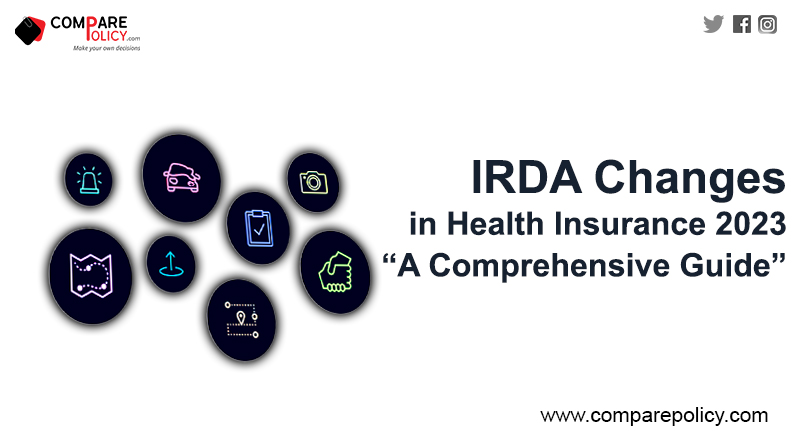IRDA Changes in Health Insurance 2023: A Comprehensive Guide
IRDA changes 2023, health insurance, insurance policy, coverage, premium, policyholders, regulations, benefits, healthcare, network hospitals, and pre-existing conditions.
In a world where healthcare costs are on the rise, having a robust health insurance policy is crucial to ensure financial security and access to quality medical care. The Insurance Regulatory and Development Authority of India (IRDA) has always played a pivotal role in safeguarding the interests of policyholders while promoting a healthy insurance industry. As of 2023, the IRDA has introduced significant changes to the landscape of health insurance, aimed at improving the overall experience for policyholders and aligning policies with the evolving healthcare landscape. Let’s delve into these changes and understand how they impact the insured.
Table Content
- Understanding the IRDA Changes in Health Insurance 2023
- Enhanced Coverage Options:
- Pre-existing Conditions:
- Standardization of Definitions:
- Limitations on Co-Payment:
- Telemedicine Benefits:
- Higher No-Claim Bonus:
- Impact on Policyholders
- Comprehensive Coverage:
- Reduced Financial Burden:
- Accessible Healthcare:
- Pre-existing Condition Coverage:
- Incentives for Healthy Living:
- Adapting to the Changes
- Review Your Policy:
- Explore Coverage Options:
- Understand Waiting Periods:
- Utilize Telemedicine:
- Focus on Preventive Care:
- About Compare Policy
- Frequently Asked Questions (FAQs).
- Related posts:
Understanding the IRDA Changes in Health Insurance 2023
Enhanced Coverage Options:
One of the notable changes brought about by the IRDA in 2023 is the expansion of coverage options. Insurers are now mandated to offer a wider range of coverage plans tailored to the diverse needs of policyholders. These plans are designed to accommodate varying budgets and healthcare requirements.
Pre-existing Conditions:
The new IRDA regulations have addressed the issue of pre-existing conditions. Earlier, policyholders often faced challenges in getting coverage for these conditions. However, with the new changes, insurers are required to provide coverage for pre-existing conditions after a waiting period, thus ensuring that policyholders receive the medical attention they need.
Standardization of Definitions:
avoid confusion and misinterpretation, IRDA has standardized the definitions of critical terms across all insurance policies. This ensures transparency and prevents any ambiguity when policyholders seek to understand the scope of their coverage.
Limitations on Co-Payment:
Co-payment, wherein policyholders share a percentage of medical expenses, has been a point of contention in health insurance. The IRDA changes have put a cap on the co-payment clause, providing relief to policyholders who were burdened by high out-of-pocket expenses.
Telemedicine Benefits:
Recognizing the growing importance of telemedicine, especially in light of the global pandemic, IRDA has mandated that insurers include telemedicine benefits in their policies. This inclusion makes healthcare more accessible and convenient, allowing policyholders to consult with doctors remotely.
Higher No-Claim Bonus:
The new regulations also incentivize policyholders to maintain a healthy lifestyle and make fewer claims. Insurers are now required to offer higher no-claim bonus percentages for each claim-free year. This not only encourages policyholders to prioritize their well-being but also helps in reducing the financial strain on insurers.
Impact on Policyholders
These IRDA changes have significant implications for policyholders, offering them greater control and transparency over their health insurance experience. Here’s how these changes benefit policyholders:
Comprehensive Coverage:
The expanded coverage options enable policyholders to choose plans that best align with their healthcare needs, ensuring that they receive the necessary medical attention without straining their finances.
Reduced Financial Burden:
With limitations on co-payment and higher no-claim bonuses, policyholders can experience reduced financial stress during medical emergencies. This encourages them to seek timely treatment without worrying about hefty out-of-pocket expenses.
Accessible Healthcare:
The inclusion of telemedicine benefits in insurance policies enhances accessibility to healthcare services, particularly in remote areas or during situations when physical visits to hospitals are challenging.
Pre-existing Condition Coverage:
The provision of coverage for pre-existing conditions after a waiting period ensures that individuals with chronic health issues can avail of the required medical services without any hindrance.
Incentives for Healthy Living:
The higher no-claim bonus percentages serve as an incentive for policyholders to adopt and maintain a healthy lifestyle.
Adapting to the Changes
As policyholders, adapting to these changes is essential to maximize the benefits offered by the new IRDA regulations. Here are some steps to consider:
Review Your Policy:
Take the time to review your existing health insurance policy in light of the new regulations. Understand how the changes affect your coverage, premiums, and benefits.
Explore Coverage Options:
With the availability of enhanced coverage plans, explore options that align with your healthcare needs. Consider factors like your family size, medical history, and budget before making a decision.
Understand Waiting Periods:
If you have pre-existing conditions, familiarize yourself with the waiting periods associated with their coverage. Plan your healthcare needs accordingly to make the most of your policy.
Utilize Telemedicine:
Embrace the convenience of telemedicine. Utilize the telemedicine benefits included in your policy for non-emergency medical consultations, follow-ups, and advice from healthcare professionals.
Focus on Preventive Care:
With the higher no-claim bonus percentages, prioritize preventive care measures to maintain a healthier lifestyle. This not only benefits your well-being but also helps you earn additional bonuses on your policy.
In Conclusion
The IRDA’s changes to health insurance in 2023 mark a significant step towards improving the insurance landscape for policyholders. By enhancing coverage options, addressing pre-existing conditions, and promoting accessible healthcare, these changes empower individuals to secure their health and financial well-being effectively. As policyholders, it’s essential to stay informed about these changes, understand their impact, and make informed decisions that align with your healthcare needs and lifestyle. By doing so, you can navigate the evolving world of health insurance with confidence and peace of mind.
About Compare Policy
[su_youtube url=”https://youtu.be/BhuN8IQQ3NY?t=7″ width=”660″ title=”Compare Jaisa Policy Vaisa – ComparePolicy.com”]
Frequently Asked Questions (FAQs).
1. What is IRDA, and how does it affect my health insurance?
- The Insurance Regulatory and Development Authority of India (IRDA) is the regulatory body that oversees the insurance industry in India. In 2023, IRDA introduced significant changes in health insurance policies to benefit policyholders and make the system more transparent and accessible.
2. What are the key changes introduced by IRDA in 2023?
- The key changes include enhanced coverage options, coverage for pre-existing conditions, standardization of definitions, limitations on co-payment, inclusion of telemedicine benefits, and higher no-claim bonuses.
3. How do the expanded coverage options benefit me?
- The expanded coverage options allow you to choose a health insurance plan that aligns with your specific healthcare needs and budget, providing you with more comprehensive coverage.
4. Can I now get coverage for pre-existing conditions under the new regulations?
- Yes, under the new IRDA regulations, insurers are required to provide coverage for pre-existing conditions after a waiting period.
5. What is the significance of standardizing definitions in health insurance policies?
- Standardized definitions ensure that policyholders can understand the terms and conditions of their policies more easily, reducing ambiguity and confusion.
6. How do the limitations on co-payment benefit policyholders?
- The limitations on co-payment cap the amount you need to pay out of pocket for medical expenses, reducing your financial burden during medical emergencies.
7. Can you explain the inclusion of telemedicine benefits in health insurance policies?
- Telemedicine benefits allow policyholders to consult with doctors remotely, making healthcare more accessible and convenient, particularly in situations where physical visits to hospitals may be challenging.
8. What is a no-claim bonus, and how has it changed with the new regulations?
- A no-claim bonus is a benefit provided to policyholders who do not make any claims during a policy year. With the new regulations, insurers are required to offer higher no-claim bonus percentages, which can help reduce your insurance premiums and incentivize healthier living.
9. How can I adapt to these changes as a policyholder?
- To adapt to these changes effectively, review your current policy, explore the enhanced coverage options, understand waiting periods for pre-existing conditions, make use of telemedicine benefits, and focus on preventive care to maximize your no-claim bonuses.
10. Can I switch to a new health insurance policy that incorporates these changes?
- Yes, you can switch to a new health insurance policy that aligns with the new IRDA changes. However, make sure to carefully compare policies, understand the terms and conditions, and consider your specific healthcare needs before making a decision.
11. Do these changes affect the premium I pay for my health insurance?
- The changes introduced by IRDA may have some impact on the premiums you pay. It’s essential to check with your insurer to understand how these changes affect your premium and coverage.
12. How can I stay updated on further developments in health insurance regulations?
- To stay updated on health insurance regulations and changes, regularly check the IRDA’s official website, consult with your insurance provider, and consider seeking advice from a certified insurance advisor.
Remember that the specifics of how these changes affect you can vary based on your insurance provider, policy type, and individual circumstances. It’s always a good practice to consult with your insurer or a professional insurance advisor for personalized guidance.
Follow-us




